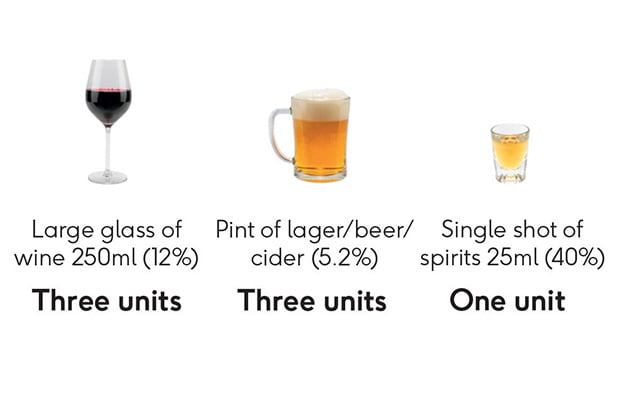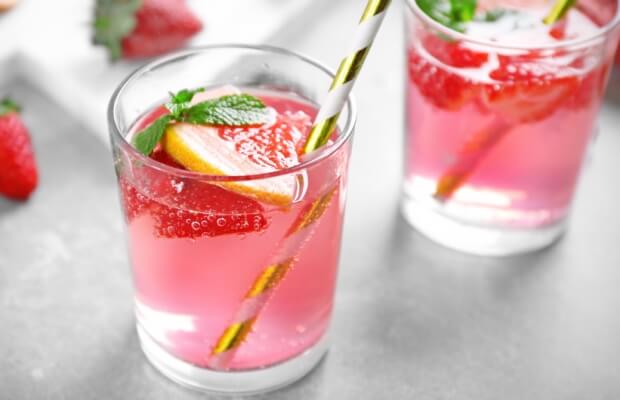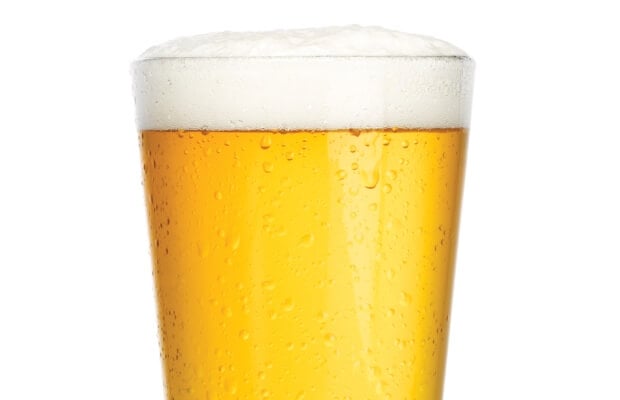What’s on this page
Recommended alcohol intake
Alcohol is a part of many people’s lives and can be hard to avoid. However, drinking more than the recommended amount can be harmful to your heart and general health.
While there is no completely safe level, if you do drink alcohol, you can reduce the health risk from alcohol by not drinking more than the maximum recommended weekly limit of 14 units of alcohol and having several alcohol-free days each week.
Fourteen units is equivalent to 6 pints of average strength beer or 6 medium (175ml) glasses of average strength wine.
The number of units in a drink is based on its size and how strong it is, measured as ABV (alcohol by volume). ABV is expressed as a percentage and is an easy way to tell how strong your drink is.

If you do drink as much as 14 units per week, it’s best to spread this evenly over 3 days or more.
Binge drinking (drinking a large amount of alcohol in one go) can also have a serious impact on your health.
Binge drinking is considered drinking:
- more than 6 units of alcohol for women
- more than 8 units of alcohol for men.
That’s about 4 pints of normal strength beer (4 per cent ABV) for men or 3 pints for women.
In the short term, binge drinking can put you at risk of falls, accidents, anti-social behaviour and alcohol poisoning, as well as affecting your mood and memory.
In the long term, regular binge drinking can also increase your risk of becoming dependent on alcohol, alcohol-related cancer and heart disease.
Want to get fit and healthy?
Sign up to our fortnightly Heart Matters newsletter to receive healthy recipes, new activity ideas, and expert tips for managing your health. Joining is free and takes two minutes.
I’d like to sign up
Effects of alcohol on your heart
Drinking too much alcohol on a regular basis is linked to many heart and circulatory conditions, including:
Drinking alcohol can also increase your chance of developing high blood pressure, type 2 diabetes or obesity, which are all risk factors for heart and circulatory diseases.
Alcohol and blood pressure
There is a clear link between regularly drinking too much alcohol and having high blood pressure (hypertension).
If it’s not treated, over time high blood pressure can lead to fatty material (plaques) building up in the arteries, which increases the risk of a heart attack or stroke.
If you already have high blood pressure, cutting down on alcohol or stopping altogether can help to reduce or control it.
Alcohol and heart rate
Alcohol is a ‘depressant’ drug, which means your brain’s control of the body is slowed down.
This means drinking very large amounts all at once can slow your heart rate and breathing to a dangerously low level.
However, alcohol can also temporarily increase your heart rate or cause heart palpitations.
Speak to your doctor if you often experience a high heart rate or palpitations. They may advise you to cut back on drinking if you find alcohol triggers your symptoms.
Alcohol and weight gain
Drinking alcohol can make it harder to manage your weight. That’s because many alcoholic drinks are high in calories.
Regularly consuming too many calories can lead to weight gain and obesity, which increases the risk of having a heart attack or stroke.
A single unit of alcohol contains around 60kcal, so the 2.3 units of alcohol in a pint of average strength beer (4 per cent ABV) equal around 182kcal (around the same as a 35g bag of crisps).
Meanwhile, a 175ml glass of wine at 13 per cent ABV contains 2 unit of alcohol, which at 159kcal is a similar amount to half a cheeseburger or 2 custard cream biscuits.
Many drinks and mixers also have a lot of added sugar, which increases the number of calories they contain.
You may find you eat more than you usually would or make less healthy food choices when you drink too.
Red wine and the heart
There’s a popular belief that alcohol, especially red wine, is good for the heart because it contains antioxidants.
However, no level of regular alcohol intake improves health, and it’s not a good idea to drink wine to protect your heart.
Other foods including grapes, blueberries and strawberries provide the same antioxidants without the negative effects of alcohol.
There are safer and healthier ways to protect and strengthen your heart, including doing more physical activity, keeping to a healthy weight and stopping smoking.
Alcohol and heart conditions
If you have already been diagnosed with a heart condition, speak to your doctor about whether it’s safe for you to drink alcohol.
Drinking alcohol is a common trigger of abnormal heart rhythms, such as atrial fibrillation. You may find cutting down or not drinking at all can help to improve your symptoms.
If you have cardiomyopathy caused by alcohol (where the heart muscle is damaged and cannot work as well as it used to), in some cases reducing your intake can improve and even reverse your condition.
Alcohol after surgery
It’s important to check with your doctor before you start drinking alcohol after heart surgery.
In hospital, you will be given medicines to control your blood pressure. If you start drinking regularly again when you get back home, this may affect your blood pressure, which means your GP will need to alter your medicines.
You may want to avoid alcohol while you’re recovering emotionally too. Many people feel low in mood after they have surgery, especially open-heart surgery.
Drinking alcohol can make these feelings much worse and last for longer, so you may want to wait until they pass before you start drinking again.
Alcohol and heart medicines
Alcohol can make some medicines less effective or cause side effects like drowsiness. Talk to your doctor or pharmacist if you take medicines for diabetes or to prevent blood clots (anticoagulants), like warfarin, as drinking alcohol can affect the way these drugs work.
Alcohol also causes damage to the liver over time, especially if you drink too much.
If you’re taking a medicine that directly affects your liver, such as statins, it’s particularly important not to drink more than the recommended amount, as this could cause even more damage.
How to cut down on alcohol
Drinking can often be involved in things you enjoy like seeing friends or watching sport, which can make cutting down difficult.
Here are some tips that can help you take control of how much you drink:
- Avoid rounds and buy your own drinks so you do not feel pressured to drink more.
- Drink water between each drink to slow you down and keep you hydrated.
- Drink soft drinks and, if it makes things easier for you socially, let other people assume it’s alcoholic (choose diet and sugar-free versions to avoid extra sugar).
- Order bottles or smaller glasses instead of pints and larger drinks.
- Set yourself a drink limit so you do not get carried away or lose count.
- Try alcohol-free versions of your favourite drinks. These also contain less calories if you’re trying to manage your weight.
Signs you’re drinking too much can include memory loss, embarrassment and injury, craving alcohol and if the people around you are concerned by how much you drink.
If you’re worried, speak to your GP or get in touch with a drink awareness charity. Alcohol Change UK can help you find out about your options.
What to read next...










